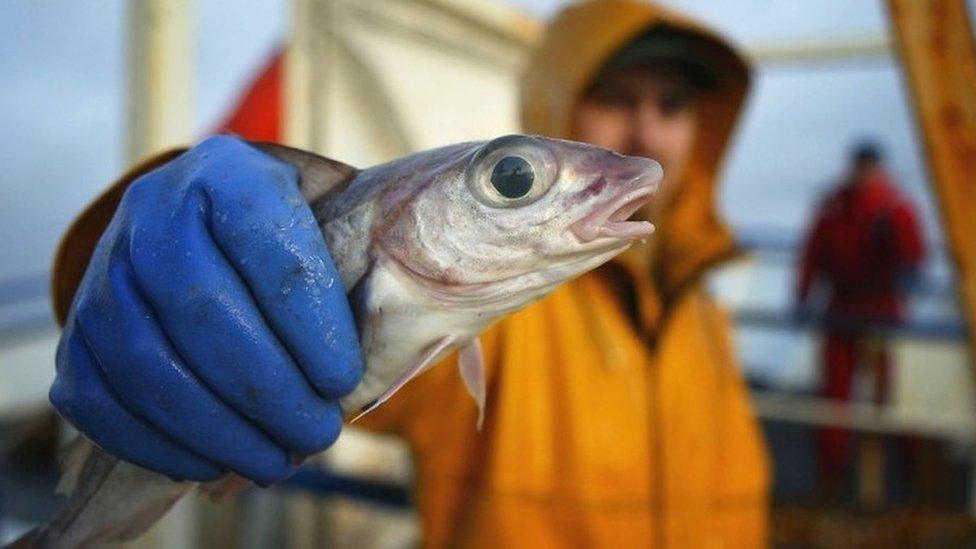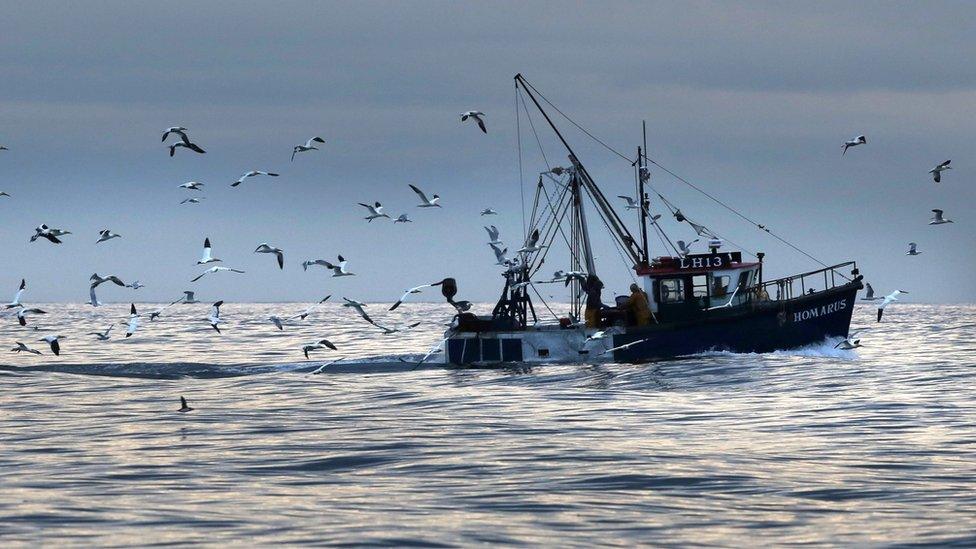Brexit: NI fishermen want 'fair share' of UK Brexit quota
- Published
- comments

Fishermen in Northern Ireland have written to the prime minister insisting they get a fair share of additional UK quotas secured by Brexit.
Two organisations representing hundreds of fishing vessels came together to make the joint appeal.
They want extra fish shared out under existing UK rules on how they are distributed among the devolved nations.
They said that other approaches being considered would discriminate against the fleet in Northern Ireland.
The Northern Ireland Fishermen's Federation (NIFF) said it currently held around 8.4% of the UK's quota.
The NIFF said officials in Whitehall seemed to believe that if Northern Ireland got most of the additional fish in the Irish Sea that would be sufficient.
However, the federation said this would not be the case, as 80% of Northern Ireland's fishing opportunities were held outside the Irish Sea.

The Northern Ireland Fisherman's Federation (NIFF) said the UK government should not "top-slice NI's tiny share of the new or additional quota"
The NIFF said Northern Ireland's interests should not be sacrificed to placate fishermen in other UK regions aggrieved about the Brexit deal.
In the letter, it said the UK government should not contemplate "top-slicing Northern Ireland's tiny share of the new or additional quota, a share based on established practices, to compensate disappointed fishermen in England, Scotland or Wales".
They told Prime Minister Boris Johnson that while Northern Ireland would benefit from around £19m of extra fish, fishermen here had also been disappointed by the outcome of the UK-EU deal on fish.
The fishing organisation said the Northern Ireland Protocol did ease the 30% of exports from NI-EU markets, but the 60% of fish going to Britain and the product coming from GB for processing here, had been hit by additional paperwork.
Extra Irish ports for UK boats
In a separate development, authorities in the Republic of Ireland have designated an additional five ports where UK registered boats can land their catch.
They had originally only made two available, one in Killybegs, County Donegal, and the other in Castletownbere, County Cork.
It meant inshore boats fishing out of County Donegal harbours like Greencastle, which were registered in Northern Ireland, could not land their catch in their home ports.
Around 40 boats in the north west had been affected by the issue. Previously, north-west fishermen said these post-Brexit restrictions "created a hard border on the island".
Greencastle is one of five extra ports that have now been made available, along with Rathmullan and Burtonport, both in County Donegal; Ros an Mhíl, County Galway; and Howth in County Dublin.
Charlie McConalogue, the Irish Minister for Agriculture, Food and the Marine, said it was an "important decision which will allow fishers in small vessels to continue their livelihoods in a safe manner".
"Following Brexit, it is important now, more than ever, to support our fishers and fishing communities and to do all we can do help them continue their livelihoods."
He added that any UK registered boats landing into any of the seven allocated Irish ports will "have to comply with additional documentary and procedural requirements than before Brexit".
'Massive disadvantage'
Skippers Darrin and Derek McAvenue said this announcement is a "starting point" for NI-registered vessels in the Republic of Ireland, but that it could put them at a "massive disadvantage" to vessels registered in the south.
The brother's boats are registered in Northern Ireland, though they fish out of Greencastle, their home port on the shores of Lough Foyle on County Donegal's Inishowen peninsula.
The new rules will designate Greencastle, Rathmullen and Burtonport for "non-quota species landings from vessels under 18 metres" and will operate from 14:00-20:00 GMT, Monday to Friday.
Darrin and his brother, who mostly catch shellfish, said it essentially creates "a weekend border" for NI-registered smaller vessels to land their catch.
"Obviously our work is weather-dependent and it could mean smaller fishing boats taking unnecessary risks going out during the week when conditions aren't great," Darrin McAvenue said.
"It gives us a smaller window to work within."
- Published5 January 2021
